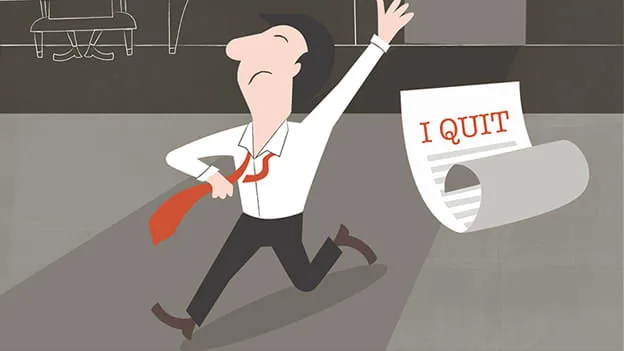
Thank God it’s Friday: The good news about the ‘Great Resignation’
Many people are asking why so many Americans are quitting their jobs or declining to return to them. Pundits and bosses usually ask the question in a tone of surprise or consternation. They should not be. Turn on your TV any Friday morning and you will hear the anchors celebrating the end of the work week. A whole restaurant franchise—TGIF—was built on the theme “Thank God it’s Friday.”
Millions of Americans hate their jobs, as reams of other evidence indicates. Americans believe they live in a democracy but, in fact, live in a Republic with some democratic features and many anti-democratic features. The most important place in most people’s lives other than the family is the workplace and it could never be mistaken for a democracy. The workplace is hierarchical.
Yes, the government imposes certain selective fairness and health and safety rules, but it is child’s play for bosses to get around them. You cannot fire someone because of their race or religion, for instance. But try proving that you were fired for such a discriminatory cause. Management has the money, the lawyers, the Supreme Court, and the time to wait you out on its side. Moreover, what is remarkable is not what is legally forbidden for managers to do. It is what is perfectly legal behavior that is remarkable and only in America in the developed world.
Most private employment is “at will,” meaning the will of the employer. The rabidly pro-Trump “my pillow” guy could fire a worker he saw on TV at an anti-Trump rally. An employer could decide that he wants to change his workforce to reflect more of a Scandinavian look. He could start firing dark haired, dark-eyed employees and hire more blonde, blue eye types.
That would be legal, which is amazing, but a smart employer would do it gradually, secretly, and selectively. You want to avoid bad publicity, controversy, and stockholder backlash if your company is publicly traded. You don’t want headlines like, “XYZ Corporation adopts an Aryans first policy.” You want to keep your best employees regardless of hair and eye color. These are company policy decisions driven by self-interest, not by legal compulsion.
The point is that the workplace is virtually a black hole where democracy and rights disappear. Great resignation is what the average worker practiced by going to work every day; a worker whose wages have been flatlining while his or her bosses have seen theirs skyrocket. This is before the pandemic made workers open their eyes, realize that life is too short and too precious to risk it every day by toiling at meaningless work.
Employers were often bewildered at this sudden sea change in worker attitudes. After all, they had long figured that, after nearly demolishing the unions, getting Republicans to decrease unemployment compensation and to shred the social safety net to shreds, and securing a pro-business, anti-worker Supreme Court, they had the labor piece settled in their favor for good.
What happened to change the equation was a great awakening and a great reversal. Before, workers were auditioning, even begging for jobs. Now the employers are the ones auditioning and begging. Offering higher salaries, improved work conditions, options like work from home. It’s almost as if the enslaved were auctioning the enslavers.
Very few people have seen this change for what it could be: a paradigm change, a new deal between labor and capital. The enhanced bargaining position is great for employees, but I doubt many employers or owners would agree. Coercion long has been a key part of their toolkit, and nothing is more effective at producing compliance than the risk of losing your income, and as a result possibly your house, your car, and your credit.
The new assertiveness of workers has been long in coming and is good for society by tending to make it a little less unequal. But for most employers, it’s a world that has been turned on its head and they would like to right it again.
Will they succeed? It will take a great leap in consciousness, organization, and politics to make them fail. Long term, the balance of forces is massively tilted in favor of employers. They own the Senate, the Supreme Court, the means of production, the Republican Party. They have on their side myths like the work ethics and the clichés like “idle hands are the devil’s workshop.” They have most of the money too.
Yet if the pandemic has proven anything—other than Donald’s Trump perversity and malfeasance—it is that workers too are essential for production and profit. This juncture could teach employers that, and maybe even convince them that treating employees fairly is good for the bottom line in the long run. The problem with that is that corporate thinking today—I realize that corporate thought is an oxymoron, a contradiction in terms—is overwhelmingly short range, oriented to the stock price today and this quarter’s earnings.
If the worker rebellion against the status quo does not change their mind, the power of peer example might. Jeff Bezos comes to mind. Could he have built his empire from selling books online one at a time to a behemoth company by focusing only on the immediate future? No way, José.
A more just economy could be as profitable and better for most people and their consciences. But can we get there from here in a society in which the most politically powerful religious force is one based on Calvinist theology, evangelical Christianity, that focuses—hypocritically—on right belief while ignoring the central Christian emphasis on right action? “The answer, my friend,” as Bob Dylan sang, “is hanging in the wind.”
Let’s get the wind blowing in the right, I mean left, direction.


